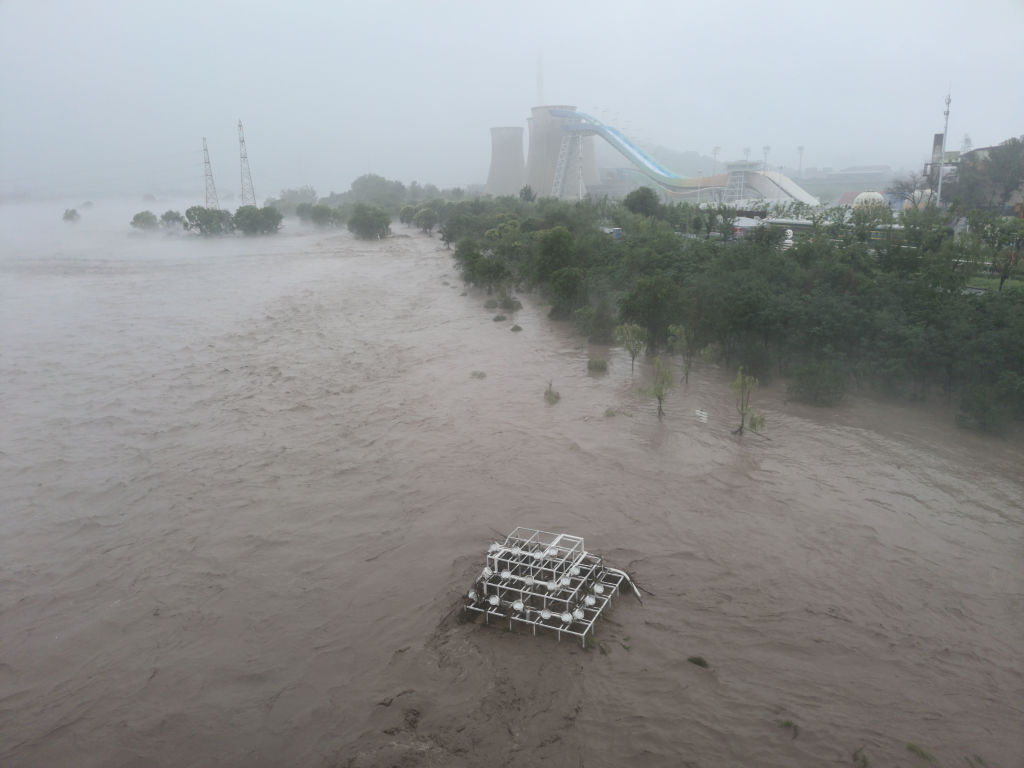20 dead and 27 missing after lethal downpour in Beijing


A free daily email with the biggest news stories of the day – and the best features from TheWeek.com
You are now subscribed
Your newsletter sign-up was successful
Days of unprecedented heavy downpours around Beijing, China's capital, have triggered massive flooding and landslides, leaving at least 20 people dead and 27 missing. Authorities have deemed it the heaviest deluge in a decade, as the remnants of Typhoon Doksuri batter the area.
Two days of intense rain prompted the city to close tourist attractions and mass evacuate residents. The worst effects were felt in the city's outskirts, "where downpours overwhelmed riverbeds that usually stay dry for much of the year," The New York Times reported.
In Beijing, at least 11 people died, and 27 others were reported missing, per state broadcaster CCTV. An additional nine deaths were reported in the Hebei province just outside the city. Overall, the "sprawling megacity" saw "an entire month's worth of rainfall over 48 hours — an average 175.7 millimeters (nearly 7 inches)," per CNN Weather. In the western district where most of the deaths were reported, "the downpours were far worse," CNN added.
The Week
Escape your echo chamber. Get the facts behind the news, plus analysis from multiple perspectives.

Sign up for The Week's Free Newsletters
From our morning news briefing to a weekly Good News Newsletter, get the best of The Week delivered directly to your inbox.
From our morning news briefing to a weekly Good News Newsletter, get the best of The Week delivered directly to your inbox.
The storms are "marked by their long duration, large accumulative rainfall and high dangers of disaster," Fang Chong, a senior forecaster with China's Central Meteorological Observatory, told Xinhua, a state-run news agency. The deadly rain was caused by moist air that was pushed to the north by the recent typhoon, according to meteorologists in the area. The capital issued a "red alert" warning for residents in the most impacted districts to stay indoors.
While it's not abnormal for China to experience typhoons and heavy rainfall during the summer, experts warn that the frequency and severity of the annual rain season have been worsened by climate change, CNN reported.
A free daily email with the biggest news stories of the day – and the best features from TheWeek.com
Theara Coleman has worked as a staff writer at The Week since September 2022. She frequently writes about technology, education, literature and general news. She was previously a contributing writer and assistant editor at Honeysuckle Magazine, where she covered racial politics and cannabis industry news.
-
 The ‘ravenous’ demand for Cornish minerals
The ‘ravenous’ demand for Cornish mineralsUnder the Radar Growing need for critical minerals to power tech has intensified ‘appetite’ for lithium, which could be a ‘huge boon’ for local economy
-
 Why are election experts taking Trump’s midterm threats seriously?
Why are election experts taking Trump’s midterm threats seriously?IN THE SPOTLIGHT As the president muses about polling place deployments and a centralized electoral system aimed at one-party control, lawmakers are taking this administration at its word
-
 ‘Restaurateurs have become millionaires’
‘Restaurateurs have become millionaires’Instant Opinion Opinion, comment and editorials of the day
-
 The ‘ravenous’ demand for Cornish lithium
The ‘ravenous’ demand for Cornish lithiumUnder the Radar Growing need for critical minerals to power tech has intensified ‘appetite’ for lithium, which could be a ‘huge boon’ for local economy
-
 How climate change is affecting Christmas
How climate change is affecting ChristmasThe Explainer There may be a slim chance of future white Christmases
-
 Blue Origin launches Mars probes in NASA debut
Blue Origin launches Mars probes in NASA debutSpeed Read The New Glenn rocket is carrying small twin spacecraft toward Mars as part of NASA’s Escapade mission
-
 Why scientists are attempting nuclear fusion
Why scientists are attempting nuclear fusionThe Explainer Harnessing the reaction that powers the stars could offer a potentially unlimited source of carbon-free energy, and the race is hotting up
-
 Dinosaurs were thriving before asteroid, study finds
Dinosaurs were thriving before asteroid, study findsSpeed Read The dinosaurs would not have gone extinct if not for the asteroid
-
 Africa could become the next frontier for space programs
Africa could become the next frontier for space programsThe Explainer China and the US are both working on space applications for Africa
-
 Canyons under the Antarctic have deep impacts
Canyons under the Antarctic have deep impactsUnder the radar Submarine canyons could be affecting the climate more than previously thought
-
 SpaceX breaks Starship losing streak in 10th test
SpaceX breaks Starship losing streak in 10th testspeed read The Starship rocket's test flight was largely successful, deploying eight dummy satellites during its hour in space
